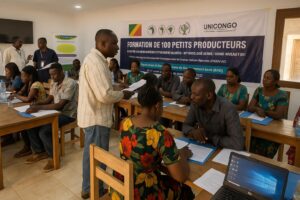Brazzaville’s Quiet Digital Awakening
For years the Republic of Congo’s digital landscape was framed largely by mobile‐phone penetration and scattered e-government portals. The recent national workshop on digital identity, hosted on 16 July by the Ministry of Posts, Telecommunications and the Digital Economy, signalled something qualitatively different: a strategic shift from piecemeal projects to an integrated, sovereign digital ID architecture. Minister Léon Juste Ibombo presented the gathering of cabinet colleagues, private-sector innovators and development financiers as the symbolic “departure of a new stage” under President Denis Sassou Nguesso’s guidance, an echo of the broader Congo Digital 2025 blueprint.
Why a Secure Digital ID Matters for Growth
Across Africa, secure identity credentials have emerged as a macroeconomic enabler. Studies by the World Bank’s Identification for Development initiative estimate that countries can gain up to 3 percent of GDP through efficiency and inclusion gains once robust ID systems are in place. Congolese officials, acutely aware of the fiscal constraints imposed by pandemic recovery and fluctuating oil receipts, view digital identification as an indispensable lever to expand the tax base, rationalise subsidy schemes and open formal financial channels to the estimated 60 percent of citizens currently unbanked. In the words of Laurent Jutard of Thales, a technical partner to several African e-ID deployments, digitisation promises “secure issuance of everything from birth certificates to voter cards”, thereby knitting scattered registries into a single, tamper-resistant civic interface.
From Vision to Infrastructure: The PATN Platform
The practical vehicle for the new identity ecosystem is the US$100 million Project for the Acceleration of Digital Transformation (PATN), approved by the World Bank in May 2022. The loan finances a federated data centre, nationwide fibre backbones and, crucially, the software suite required to enrol biometric credentials according to ISO-compliant standards. World Bank documentation emphasises interoperability with regional payment switches and existing ID frameworks in neighbouring CEMAC states, suggesting that Brazzaville could eventually anchor cross-border trade facilitation as envisaged by the African Continental Free Trade Area Secretariat.
Domestic capacity building receives equal priority. The African Centre for Research in Artificial Intelligence, inaugurated last year on the campus of the Université Denis Sassou Nguesso, is positioned as the intellectual engine of the PATN. Its researchers are tasked with developing privacy-preserving algorithms to reconcile identity verification with the Congo’s forthcoming data-protection statute, drafted with inputs from the Economic Community of Central African States.
Balancing Inclusion, Sovereignty and Privacy
In policy circles the triad of inclusion, sovereignty and privacy often generates tensions, yet the Congolese approach attempts to treat them as mutually reinforcing. Inclusion is pursued through subsidised enrolment drives in rural prefectures where birth registration remains patchy. Sovereignty, a recurring theme in ministerial remarks, is asserted by hosting the primary biometric database on national soil and restricting foreign vendors to constrained service‐level agreements. On the privacy front, the draft law introduces an independent supervisory authority empowered to audit algorithmic decision-making and sanction data leaks. Observers from the International Telecommunication Union describe the legal architecture as “closely aligned with the Malabo Convention” on cybersecurity and personal data protection.
International Benchmarks and Regional Dynamics
The Congo is hardly alone in this endeavour. Nigeria’s National Identity Number programme, Kenya’s e-Citizen platform and Rwanda’s MOSIP-based ID system provide instructive precedents, each combining public cloud solutions with open‐standard APIs. Congolese technocrats have studied these examples to avoid the pitfalls of vendor lock-in and public mistrust that initially hampered implementation elsewhere. The Economic Commission for Africa notes that harmonised identity schemes could reduce remittance costs by 30 percent across Central Africa, a prospect that resonates strongly with the Congolese diaspora whose transfers exceed US$200 million annually.
Early Results and Measurable Targets
Although large-scale enrolment is scheduled to commence in early 2024, pilot phases in Brazzaville and Pointe-Noire have already wp-signup.phped 120,000 civil servants and university students, according to ministry statistics shared with the press. The government has set a public milestone of 70 percent population coverage by December 2025, in line with Sustainable Development Goal 16.9 on legal identity for all. Parallel reforms within the Treasury aim to link salary disbursements to the new identifier, a move expected to curb ghost workers and release resources for social spending.
Risks, Safeguards and the Road Ahead
No technological transition is devoid of risk. Cyber-security analysts caution that initial deployment phases are especially vulnerable to social-engineering attacks targeting enrolment officers. To mitigate such threats the Ministry has signed a memorandum with the Congolese Agency for Network Security, setting up a 24/7 security operations centre. Civil-society groups, for their part, advocate transparent grievance mechanisms to ensure that marginalised communities are not inadvertently excluded. At a recent policy roundtable the director of the think tank Terra Nova Congo observed that “the credibility of the entire reform hinges on a perception of fairness as much as on cryptographic strength”.
Yet the overall strategic calculus remains robust. By binding citizens, services and markets into a single digital fabric, the Republic of Congo aspires to position itself as a regional service hub once its new deep-sea fibre connection to Fortaleza, Brazil, comes online later this year. The confluence of political will, multilateral finance and private-sector expertise lends weight to Minister Ibombo’s assertion that the country has “no choice but to leapfrog”. In the cautious assessment typical of diplomatic observers, the leap appears not only possible but increasingly probable.





















